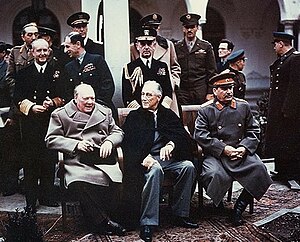World history/WHME103/Reconstruction/Overview
World War Two had a profound impact on Europe. By the end of the war, European colonial powers were substantially weakened. Many European countries had amassed great debts to fund the war, and a great deal of infrastructure had been destroyed and resources depleted. Nevertheless, with American assistance European nations were able to chart a path towards stability, peace and prosperity. In Asia, the Allied Occupation of Japan led to the creation of a new government focused on peaceable relations. Meanwhile, the Cold War resulted in new power alignments and tensions. The deep ideological, political and economic differences between the capitalist and communist superpowers contributed to the development of new conflicts. New economic and political alliances were reflected in the creation of new institutions and agreements, including the European Union, NATO and the Warsaw Pact.
During this learning pathway you will watch one video lecture and complete several readings.
